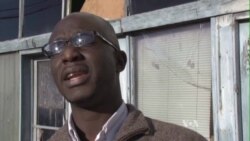Thousands of people are gathering Saturday in the small U.S. Southern City of Selma, Alabama, to commemorate the 50th anniversary of a historic voting rights march.
The 1965 event, known as “Bloody Sunday,” cast a spotlight on racial discrimination and the plight of millions of African-Americans denied the right to vote in parts of the South. Decades after civil rights battles in Selma and surrounding communities the focus has shifted to economic priorities.
“What about better jobs, better training, and schooling? We need more things going. We have to come together and work together,” said Selma business owner Kevin Seay, who is trying to make it through tough economic times.
“If Selma is growing in the right way, then we can have the greatest economic expansion that anybody could ever look for,” he said.
While Seay and his wife opened a clothing and accessory store last year and started making some money, many black-owned businesses were forced to close during the economic downturn seven years ago. The boarded up storefronts indicate the area lacks job opportunities — even though the institutional segregation of five decades ago is a thing of the past.
Longtime Alabama State Senator Hank Sanders says it is tragic a worldwide symbol of the civil rights struggle has not prospered.
“The economics and the political [situation] did not come together in Selma to produce the desired results, and one of the things I hope out of this is that people will see that Selma now needs to harvest those seeds that were planted,” he said.
High unemployment
Unemployment for young blacks here is more than 20 percent and some families live in government subsidized housing, as they did 50 years ago. Selma radio station owner Glenn King is pushing economic development by supporting black-owned businesses. He says if every black business could add one employee it would reduce black unemployment to the level of whites.
"I have encouraged blacks that, together we stand — divided we fall, and [to] show other blacks what they can do if they invest in something in their community,” he said.
Cromwell Handy, the pastor of the Reverend Martin Luther King’s historic church in Montgomery, says, “I believe that we are a lot better now clearly than we were before [50 years ago]. I believe our biggest issue now is a polarization due to the economic issues of today, rather than race,” he said.
Handy says African Americans can fulfill Dr. King's dream by demanding income equality.
"We must forward march. We must stay away from what we know from a military term 'marking time.' We just cannot march in place, focus on the past. We have to forward march from here for a better nation and a better world,” he said.
Staying involved
Birmingham Mayor William Bell believes blacks can create or generate economic opportunities by staying involved in the political process.
“To protect those opportunities you have got to fully participate. You got to be a full-fledged citizen and that right to vote is critical to economic power, it is critical to social power, and it is critical to cultural power," he said.
In Selma, Kevin Seay wants to help fellow entrepreneurs. Someday he hopes to hire more workers, giving something back to the community.
“Now you are starting to see more blacks are coming together to help one another," he said. "Because I feel that if one can make it then the next one can make it. If I can get started then something I can probably do will pull you up and help you along the way.”
Community leaders believe by working together they can bring about better financial times for this community that was so pivotal to the civil rights movement.





